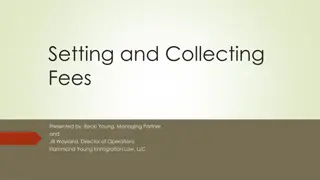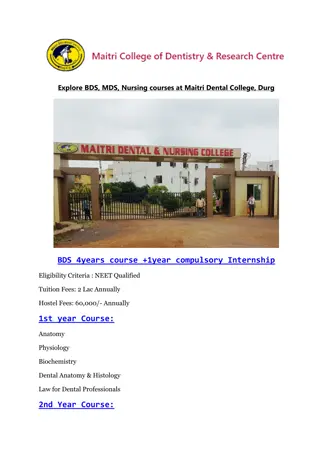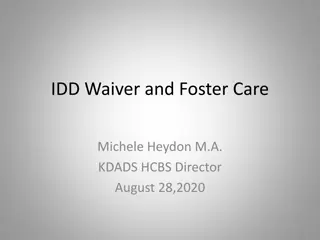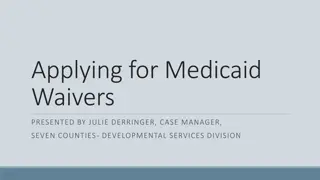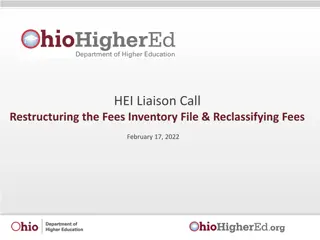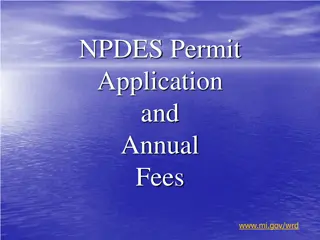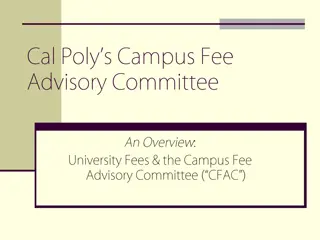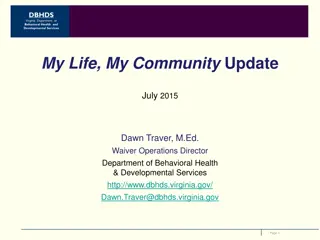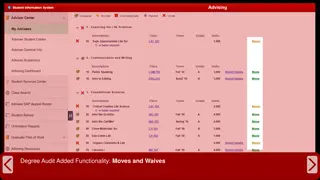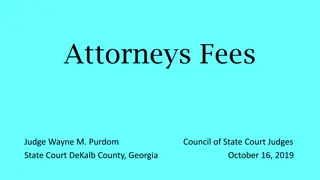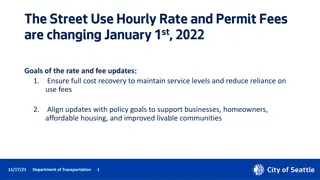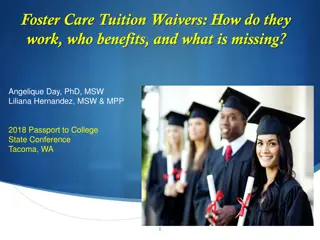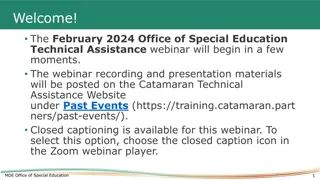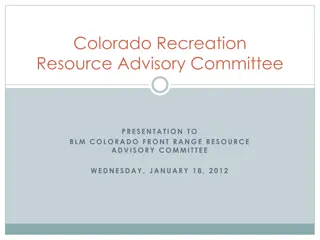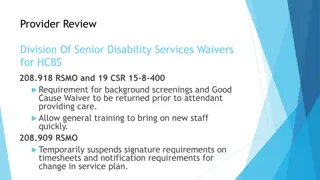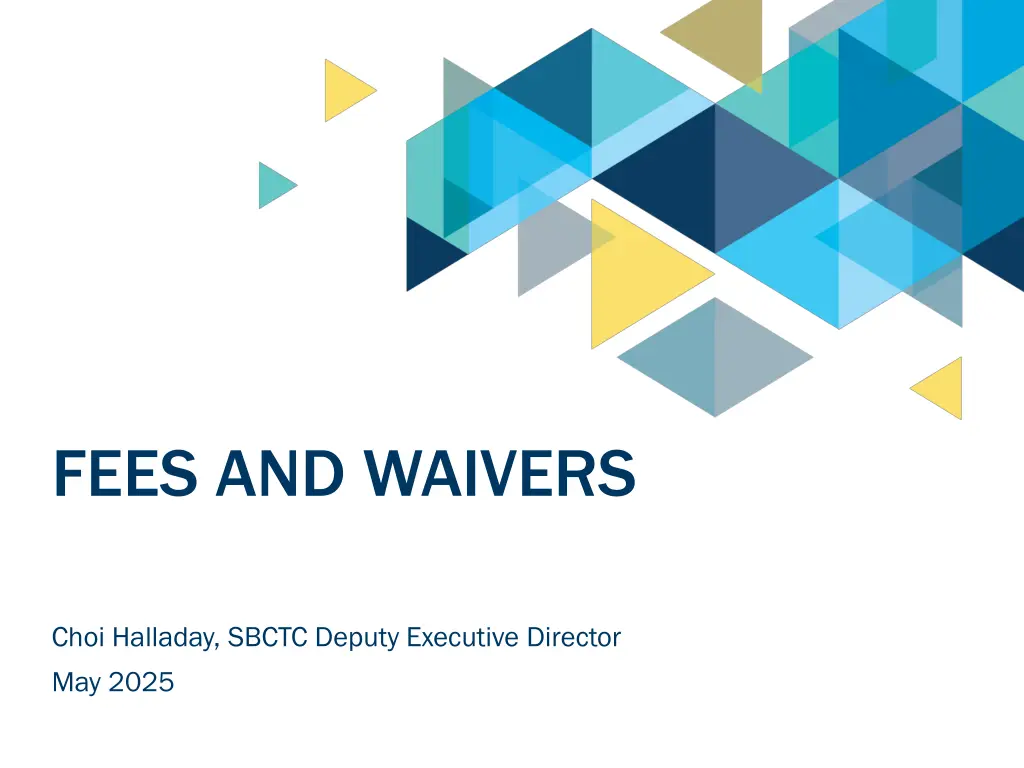
Understanding Higher Education Fees and Waivers in Washington
Explore the statutory authority and regulations governing various fees in higher education institutions in Washington, including operating fees, tuition fees, building fees, services and activities fees, technology fees, and voluntary fees of students. Learn about the processes for setting, increasing, and managing different types of fees as defined by RCW. Stay informed about the fee structures and mechanisms to ensure college affordability and student access to essential resources.
Download Presentation

Please find below an Image/Link to download the presentation.
The content on the website is provided AS IS for your information and personal use only. It may not be sold, licensed, or shared on other websites without obtaining consent from the author. If you encounter any issues during the download, it is possible that the publisher has removed the file from their server.
You are allowed to download the files provided on this website for personal or commercial use, subject to the condition that they are used lawfully. All files are the property of their respective owners.
The content on the website is provided AS IS for your information and personal use only. It may not be sold, licensed, or shared on other websites without obtaining consent from the author.
E N D
Presentation Transcript
FEES AND WAIVERS Choi Halladay, SBCTC Deputy Executive Director May 2025
STATUTORY AUTHORITY Broadly speaking, RCW 28B.15
STATUTORY FEES Fees proscribed in RCW that the legislature mandates the collection of and regulates the use and increases of.
OPERATING FEES RCW 28B.15.031 Basically, state FTE Tuition Increases set via process defined in RCW Increases by 14 year rolling average of median hourly wage in the State of Washington
TUITION FEES DEFINED IN RCW 28B.15.020 Operating Fees + Building Fees RCW 28B.15.067 Defines process for increasing Tuition Operating Fees which is never defined, but implied to be the Operating Fee portion of Tuition Fees that are defined in RCW 28B.15.020 The increase is based on a 14-year rolling average of the median hourly wage for the State of Washington College Affordability Program (RCW 28B.15.066) General Fund Appropriation to offset Tuition Fee DECREASE mandated by the legislature in 2015. This appropriation increases using CPI for Washington
BUILDING FEES RCW 28B.15.025 Increases are set via a formula in RCW 28B.15.069 It s a crazy formula that s interpreted differently across higher education.
SERVICES AND ACTIVITIES FEES DEFINED IN RCW 28B.15.041 Colleges MUST charge and collect (RCW 28B.15.069(2)) Fee may increase by no more than tuition increase percentage, unless that increase is insufficient for debt service on student approved COPs
TECHNOLOGY FEES RCW 28B.15.051 Must be voted in by students Expenditures are for technology access for students, including internet access Increases must be approved by student government Annual budget must be approved by student representatives
VOLUNTARY FEES OF STUDENTS (RCW 28B.15.610) Must be voted in by students Must be for student purposes
LOCAL FEES Local boards have broad authority to charge these in order to operate all existing community colleges in its district (RCW 28B.50.140(1)) Student Housing Fees (RCW 28B.50.140(7)) Self-Support educational programming fees (RCW 28B.50.140(16) and RCW 28B.15.067(4)) Contracted educational programming fees (RCW 28B.50.140(17) Class consumable fees, etc.
FINES Not legally considered to be a fee Penalty for action or inaction that violates policy Fines can be changed by the local board and are not subject to limitations on increases
INITIATIVE 601 AND FISCAL GROWTH FACTOR Only matters for Mandatory Fees other than fees that have increases defined by RCW According to AG, the term (mandatory fee) includes charges mandated for a governmental service or privilege, but would not include charges in commercial transactions where the state participates as a party to a contract, or as a seller in the marketplace." Enterprise (bookstore, food service, childcare, parking, etc.) and passthrough charges are not subject to Fiscal Growth Factor University of Washington website has a great explanation of how I- 601 growth factors affect higher education fees. (APS 33.3, Fee Increases Subject to Initiative 601 Limitations (washington.edu))
STATUTORY AUTHORITY Local Colleges Boards do NOT have the authority to create a local operating fee waiver unless the State Board permits them to do so. RCW 28B.15.915 the community and technical colleges, subject to state board policy, may waive all or a portion of the operating fees for any student State Board Policies generally pass on the authority to local boards for statutorily optional waivers Local Boards can waive local fees
STATUTORILY MANDATED WAIVERS The State Board cannot bypass legislative intent so whether the State Board grants explicit authority or not, local colleges must implement statutorily mandated waivers. RCW 28B.15.520 Children and Spouse of Police/Firefighters killed or injured in the line of duty Shall waive all of tuition fees and S&A fees RCW 28B.15.621(4) Children and Spouse of military member KIA/MIA/POW or injured in active duty shall waive all tuition and fees RCW 28B.15.395 Wrongfully Convicted Person and their children must waive all tuition and fees
STATUTORILY OPTIONAL WAIVERS TONS and TONS RCW 28B.15.740 Local Waivers Permitted for needy students RCW 28B.15.522 (long-term unemployed, optional waiver) 28B.15.543 (Age 60+ students, optional waiver) 28B.15.558 (State or K-12 Employee, optional waiver) 28B.15.621(3) (Veterans who didn t go to war) Etc, etc, etc
STATE BOARD MANDATORY WAIVERS ABE/ESL/GED Prep Apprenticeship
RCW 28B.15.910 LIMITATION ON TOTAL AMOUNT OF OPERATING FEES WAIVED For CTCs as a whole it is 35% of total operating fee collection Some statutory waivers are not counted toward the cap Waiver Report to Legislature (RCW 28B.15.915) Due Jan 31 of odd numbered years
WARNING: WAIVERS THAT ARE NOT OFFICIALLY ADOPTED BY THE LEGISLATURE OR STATE BOARD OR LOCAL BOARD ARE CONSIDERED A VIOLATION OF THE WASHINGTON STATE S CONSTITUTIONAL BAN ON GIFTING PUBLIC FUNDS.
NON-RESIDENT TUITION DIFFERENTIAL WAIVERS Two approaches are defined in statute Approach #1: RCW 28B.15.915 State Board Waiver - Waiver of nonresident operating Fee Differential Only applies to Operating Fee, Not Building Fee Approach #2: RCW 28B.76.685 Border County Higher Education Opportunity Project Only applies to these specific colleges: CBC, Clark, LCC, GHC, WWCC Only applies to students who Currently live in Washington Immediate prior residence was in one of 13 specific counties in Oregon and lived there for at least 90 days If they meet the criteria, these students can have their residency classification changed to resident for the purpose of tuition rate application.

